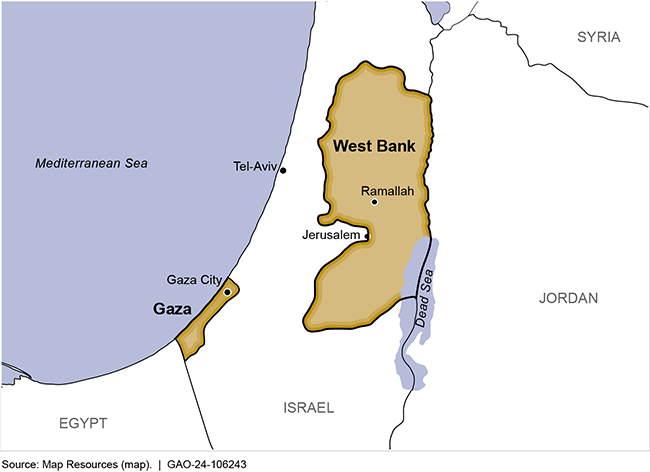West Bank and Gaza Aid: USAID Generally Ensured Compliance with Anti-terrorism Policies and Addressed Instances of Noncompliance
Fast Facts
Since 1993, the U.S. government has provided more than $7.6 billion in assistance to Palestinians in the West Bank and Gaza—primarily through the U.S. Agency for International Development. USAID has used the funds to provide humanitarian relief and increase economic opportunity in the region, among other things.
Federal law prohibits providing support to individuals or groups associated with terrorism. USAID also has internal policies and procedures in place to ensure that the program does not inadvertently provide funding to terrorists. We found that USAID generally complied with these requirements during fiscal years 2020 through 2022.
The West Bank and Gaza and Surrounding Countries

Highlights
What GAO Found
The U.S. government resumed the U.S. Agency for International Development's (USAID) West Bank and Gaza program using Economic Support Fund assistance in April 2021 after suspending the program in January 2019. In resuming the program, USAID used its established policies and procedures, such as Mission Order 21, for making awards and implemented some additional vetting requirements for U.S.-based organizations. Mission Order 21 establishes requirements to ensure that the program does not inadvertently provide funding to entities or individuals associated with terrorism. During program suspension, USAID reassigned experienced staff from the West Bank and Gaza mission to other missions on a temporary basis. Those staff came back to the program when it resumed. As of September 2022, USAID has obligated all $150 million in fiscal year 2020 and 2021 Economic Support Fund assistance that Congress provided. Most funding was obligated for project assistance, and about 16 percent of the funding was obligated for debt relief payments to the East Jerusalem Hospital Network, as allowable under U.S. law.
Photo of U.S. Agency for International Development-Funded Project for a Wastewater Collection System

GAO found that USAID generally complied with Mission Order 21 requirements during fiscal years 2020 through 2022. Mission Order 21 outlines three requirements: vetting procedures, anti-terrorism certifications, and mandatory provisions in all award documents. GAO reviewed all 18 prime awards active as of September 2022, and a random generalizable sample of 106 subaward actions that were active during fiscal years 2020 through 2022. GAO's analysis found that USAID had completed vetting in all cases where it was required for the prime awards and subaward actions in the sample but had vetted one subaward action late. In addition, all prime awards and subawards in the sample that required anti-terrorism certifications and mandatory provisions included them. To detect issues with active prime awards, USAID commissioned compliance reviews and financial audits. USAID conducted eight compliance reviews, two of which found instances of noncompliance, including missing or late vetting of subawards and not reporting a subaward to USAID. The awardees addressed the issues of noncompliance, according to the reviews. The compliance reviews also determined whether the prime awardees obtained the necessary vetting approvals for subawards, as needed. Additionally, USAID conducted four financial audits of prime awards that assessed compliance with Mission Order 21. None of these financial audits found issues of noncompliance.
Why GAO Did This Study
Since 1993, the U.S. government has provided more than $7.6 billion in bilateral assistance to Palestinians in the West Bank and Gaza. This assistance, primarily through the Economic Support Fund, supports projects in areas including economic growth and recovery. According to USAID and the Department of State, the U.S. government resumed the West Bank and Gaza program in April 2021, following the suspension of Economic Support Fund assistance in 2019 due to a combination of policy and legal actions. USAID is primarily responsible for administering the assistance to the West Bank and Gaza and ensuring compliance with its anti-terrorism policies and procedures.
Appropriations acts for fiscal years 2020 through 2022 include provisions for GAO to review the treatment, handling, and uses of funds provided through the Economic Support Fund for assistance to the West Bank and Gaza. This report examines (1) the status of the program for fiscal years 2020 through 2022, as of September 30, 2022, and (2) the extent to which USAID complied with its policies and procedures to ensure that program assistance did not provide support to entities or individuals associated with terrorism in fiscal years 2020 through 2022.
GAO reviewed relevant laws and USAID data, policies and procedures, compliance reports, and financial audits. GAO analyzed active prime awards and a random generalizable sample of subaward actions for compliance with USAID's anti-terrorism policies and procedures. GAO also interviewed USAID and State officials.
For more information, contact Latesha Love-Grayer at (202) 512-4409 or LoveGrayerL@gao.gov.
